Academiashop
On this page, you find all documents, package deals, and flashcards offered by seller academiashop.
- 136
- 0
- 2
Community
- Followers
- Following
138 items
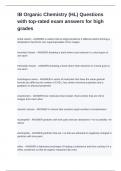
IB Organic Chemistry (HL) Questions with top-rated exam answers for high grades
chiral carbon - ANSWER-A carbon that is singly bonded to 4 different atoms forming a tetrahedron that forms non-superimposable mirror images homolytic fission - ANSWER-breaking a bond where each electron in a bond goes to one atom heterolytic fission - ANSWER-breaking a bond where both electrons in a bond goes to one atom homologous series - ANSWER-A series of molecules that have the same general formula but differ by the number of CH2's, has similar chemical properties and a gradati...
- Package deal
- Exam (elaborations)
- • 2 pages •
chiral carbon - ANSWER-A carbon that is singly bonded to 4 different atoms forming a tetrahedron that forms non-superimposable mirror images homolytic fission - ANSWER-breaking a bond where each electron in a bond goes to one atom heterolytic fission - ANSWER-breaking a bond where both electrons in a bond goes to one atom homologous series - ANSWER-A series of molecules that have the same general formula but differ by the number of CH2's, has similar chemical properties and a gradati...
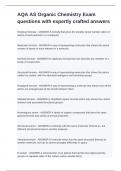
AQA AS Organic Chemistry Exam questions with expertly crafted answers
Empirical formula - ANSWER-A formula that gives the simplist whole number ration of atoms of each element in a compound Molecular formula - ANSWER-A way of representing molecules that shows the actual number of atoms of each element in a molecule General formula - ANSWER-An algebraic formula that can describe any member of a family of compounds Structural formula - ANSWER-A way of representing molecules that shows the atoms carbon by carbon, with the attached hydrogens and functional gr...
- Package deal
- Exam (elaborations)
- • 5 pages •
Empirical formula - ANSWER-A formula that gives the simplist whole number ration of atoms of each element in a compound Molecular formula - ANSWER-A way of representing molecules that shows the actual number of atoms of each element in a molecule General formula - ANSWER-An algebraic formula that can describe any member of a family of compounds Structural formula - ANSWER-A way of representing molecules that shows the atoms carbon by carbon, with the attached hydrogens and functional gr...

Organic Chemistry: Alkenes, Complete exam with answers guaranteed accurate
How can alkenes be made? - ANSWER-We can obtain alkenes by cracking long chain hydrocarbon molecules that come from crude oil. What are alkenes? - ANSWER-Alkenes are hydrocarbons that are unsaturated and contain a carbon to carbon double bond. Why are alkenes unsaturated? - ANSWER-Alkenes are unsaturated as they have a carbon to carbon double bond, meaning they contain two fewer hydrogen atoms than an alkane with the same number of carbon atoms (there are fewer carbon atoms that are able r...
- Package deal
- Exam (elaborations)
- • 3 pages •
How can alkenes be made? - ANSWER-We can obtain alkenes by cracking long chain hydrocarbon molecules that come from crude oil. What are alkenes? - ANSWER-Alkenes are hydrocarbons that are unsaturated and contain a carbon to carbon double bond. Why are alkenes unsaturated? - ANSWER-Alkenes are unsaturated as they have a carbon to carbon double bond, meaning they contain two fewer hydrogen atoms than an alkane with the same number of carbon atoms (there are fewer carbon atoms that are able r...
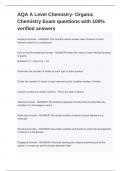
AQA A Level Chemistry- Organic Chemistry Exam questions with 100% verified answers
Empirical formula - ANSWER-The simplest whole number ratio of atoms of each element present in a compound How to find the empirical formula - ANSWER-Obtain the mass of each element present in grams (Element % = mass in g = m) Determine the number of moles of each type of atom present Divide the number of moles of each element by the smallest number of moles Convert numbers to whole numbers. This is the ratio of atoms General formula - ANSWER-The simplest algebraic formula that ca...
- Package deal
- Exam (elaborations)
- • 20 pages •
Empirical formula - ANSWER-The simplest whole number ratio of atoms of each element present in a compound How to find the empirical formula - ANSWER-Obtain the mass of each element present in grams (Element % = mass in g = m) Determine the number of moles of each type of atom present Divide the number of moles of each element by the smallest number of moles Convert numbers to whole numbers. This is the ratio of atoms General formula - ANSWER-The simplest algebraic formula that ca...
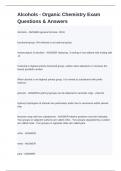
Alcohols - Organic Chemistry Exam Questions & Answers
Alcohols - ANSWER-general formula: -ROH functional group -OH referred to as hydroxyl group nomenclature of alcohols - ANSWER-replacing -3 ending of root alkane with ending with -ol If alcohol is highest priority functional group, carbon atom attached to it receives the lowest possible number. When alcohol is not highest priority group, it is named as substituent with prefix hydroxy- phenols - ANSWER-hydroxyl groups can be attached to aromatic rings - phenols hydroxyl hydrog...
- Package deal
- Exam (elaborations)
- • 5 pages •
Alcohols - ANSWER-general formula: -ROH functional group -OH referred to as hydroxyl group nomenclature of alcohols - ANSWER-replacing -3 ending of root alkane with ending with -ol If alcohol is highest priority functional group, carbon atom attached to it receives the lowest possible number. When alcohol is not highest priority group, it is named as substituent with prefix hydroxy- phenols - ANSWER-hydroxyl groups can be attached to aromatic rings - phenols hydroxyl hydrog...
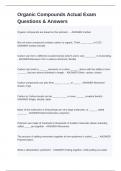
Organic Compounds Actual Exam Questions & Answers
Organic compounds are based on the element... - ANSWER-Carbon But not every compound contains carbon is organic. Think ____ ____, or CO2 - ANSWER-Carbon dioxide Carbon can form 4 different covalent bonds (why?) and is very ________ in its bonding. - ANSWER-Because of its 4 valence electrons; flexible Carbon can bond to ______ elements or to other ______ atoms with the ability to form _______ that are almost unlimited in length. - ANSWER-Other; carbon; chains Carbon compounds can also...
- Package deal
- Exam (elaborations)
- • 2 pages •
Organic compounds are based on the element... - ANSWER-Carbon But not every compound contains carbon is organic. Think ____ ____, or CO2 - ANSWER-Carbon dioxide Carbon can form 4 different covalent bonds (why?) and is very ________ in its bonding. - ANSWER-Because of its 4 valence electrons; flexible Carbon can bond to ______ elements or to other ______ atoms with the ability to form _______ that are almost unlimited in length. - ANSWER-Other; carbon; chains Carbon compounds can also...
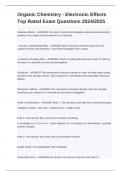
Organic Chemistry - Electronic Effects Top Rated Exam Questions 2024/2025
Inductive effects - ANSWER-The way in which electronegative atoms polarise electron density in the single bond framework of a molecule -I electron withdrawing effect - ANSWER-atoms that pull electrons away from the carbon that they are bonded to. more electronegative than carbon +I electron donating effect - ANSWER-carbon is pulling the electrons closer to itself as the atom it is bonded to is less electronegative Reactivity - ANSWER-The movement of electron density in order to break we...
- Package deal
- Exam (elaborations)
- • 2 pages •
Inductive effects - ANSWER-The way in which electronegative atoms polarise electron density in the single bond framework of a molecule -I electron withdrawing effect - ANSWER-atoms that pull electrons away from the carbon that they are bonded to. more electronegative than carbon +I electron donating effect - ANSWER-carbon is pulling the electrons closer to itself as the atom it is bonded to is less electronegative Reactivity - ANSWER-The movement of electron density in order to break we...

Organic Chemistry Common pKa Values Exam Questions Guaranteed Pass
pKa = 25 - ANSWER-C2H2 pKa = 51 - ANSWER-CH3CH3 pKa = 44 - ANSWER-C2H4 pKa = 38 - ANSWER-NH3 pKa = 35 - ANSWER-H2 pKa = 15.9 - ANSWER-CH3CH2OH pKa = 15.7 - ANSWER-H2O pKa = 10.64 - ANSWER-CH3NH3+ pKa = 9.24 - ANSWER-NH4+ pKa = 7.04 - ANSWER-H2S pKa = 6.33 - ANSWER-H2CO3
- Package deal
- Exam (elaborations)
- • 2 pages •
pKa = 25 - ANSWER-C2H2 pKa = 51 - ANSWER-CH3CH3 pKa = 44 - ANSWER-C2H4 pKa = 38 - ANSWER-NH3 pKa = 35 - ANSWER-H2 pKa = 15.9 - ANSWER-CH3CH2OH pKa = 15.7 - ANSWER-H2O pKa = 10.64 - ANSWER-CH3NH3+ pKa = 9.24 - ANSWER-NH4+ pKa = 7.04 - ANSWER-H2S pKa = 6.33 - ANSWER-H2CO3
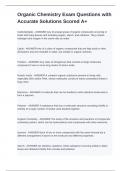
Organic Chemistry Exam Questions with Accurate Solutions Scored A+
Carbohydrates - ANSWER-Any of a large group of organic compounds occurring in foods and living tissues and including sugars, starch, and cellulose. They contain hydrogen and oxygen in the same ratio as water. Lipids - ANSWER-Any of a class of organic compounds that are fatty acids or their derivatives and are insoluble in water, but soluble in organic solvents. Proteins - ANSWER-Any class of nitrogenous that consists of large molecules composed of one or more long chains of amino acids. ...
- Package deal
- Exam (elaborations)
- • 2 pages •
Carbohydrates - ANSWER-Any of a large group of organic compounds occurring in foods and living tissues and including sugars, starch, and cellulose. They contain hydrogen and oxygen in the same ratio as water. Lipids - ANSWER-Any of a class of organic compounds that are fatty acids or their derivatives and are insoluble in water, but soluble in organic solvents. Proteins - ANSWER-Any class of nitrogenous that consists of large molecules composed of one or more long chains of amino acids. ...
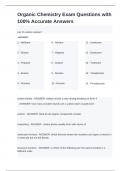
Organic Chemistry Exam Questions with 100% Accurate Answers
List 15 carbon names? -ANSWER: 1 - Methane 2 - Ethane 3 - Propane 4 - Butane 5 - Pentane 6 - Hexane 7 - Heptane 8 - Octane 9 - Nonane 10 - Decane 11 - Undecane 12 - Dodecane 13 - Tridecane 14 - Tetradecane 15 - Pentadecane carbon bonds - ANSWER: carbon shows a very strong tendancy to form 4 - ANSWER: how many covalent bonds can a carbon atom usually form carbon - ANSWER: what do all organic compounds contain everything - ANSWER: carbon ato...
- Package deal
- Exam (elaborations)
- • 4 pages •
List 15 carbon names? -ANSWER: 1 - Methane 2 - Ethane 3 - Propane 4 - Butane 5 - Pentane 6 - Hexane 7 - Heptane 8 - Octane 9 - Nonane 10 - Decane 11 - Undecane 12 - Dodecane 13 - Tridecane 14 - Tetradecane 15 - Pentadecane carbon bonds - ANSWER: carbon shows a very strong tendancy to form 4 - ANSWER: how many covalent bonds can a carbon atom usually form carbon - ANSWER: what do all organic compounds contain everything - ANSWER: carbon ato...
